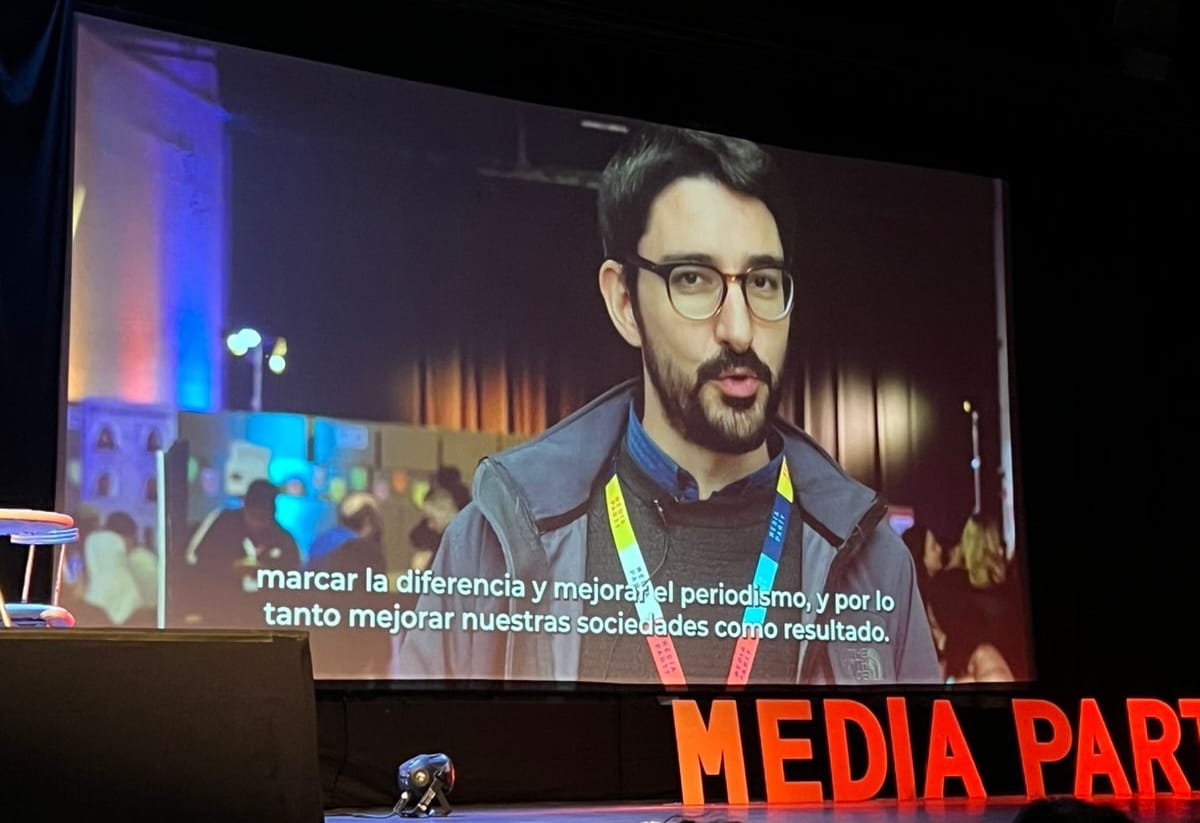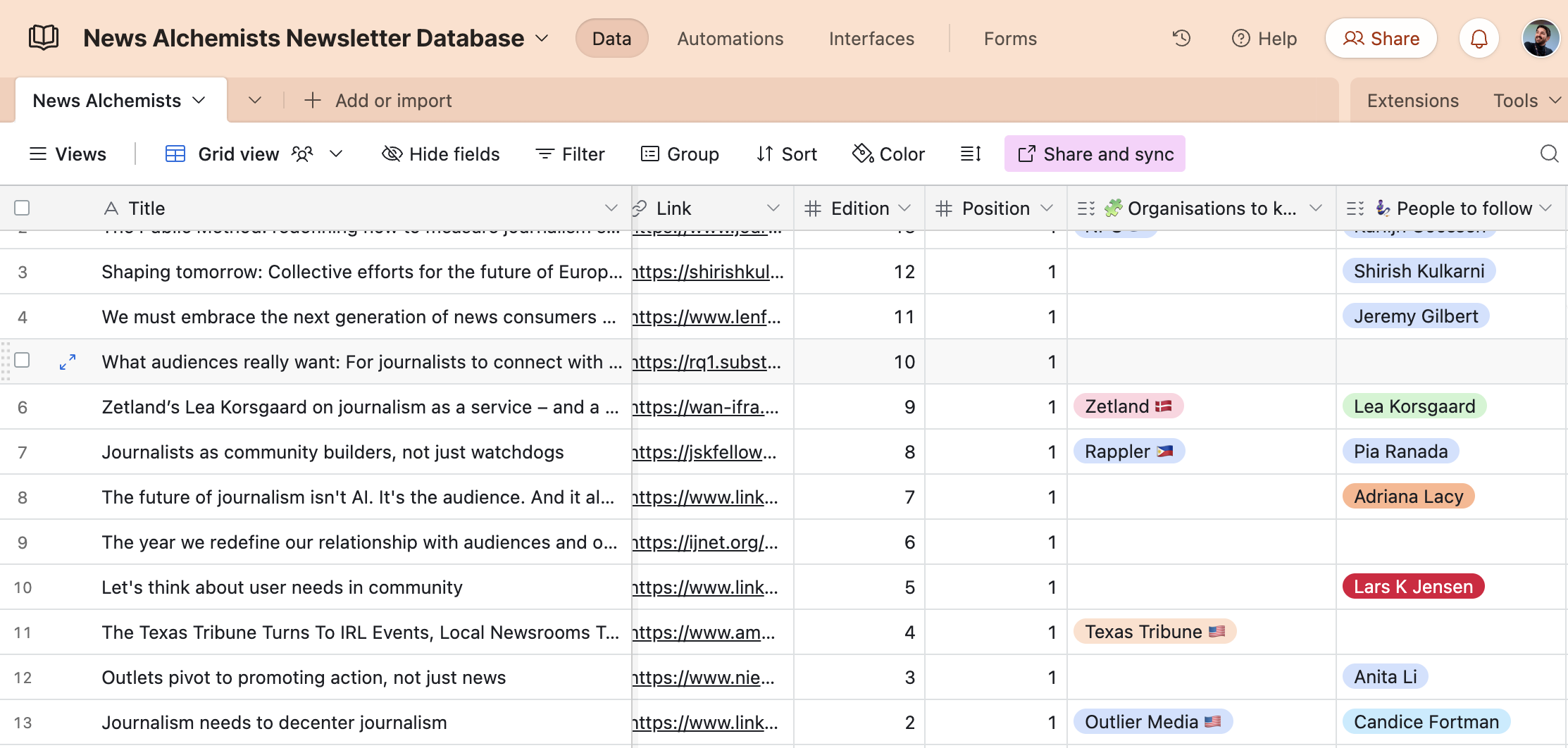🔶 #38: "What two researchers found in a yearlong quest for journalism innovation"

Hello and welcome back to the News Alchemists newsletter!
Do you remember JR3? It's the project I developed earlier this year with the Knight Lab at Northwestern University to explore how journalism might be more useful to its audiences.
(JR3 is short for 'Rethink, Recenter, Reimagine. Journalism in Transition'.)
Two months ago we launched JR3 Debate, a Google Doc with big ambitions, as I described it at the time: we wanted to see if one collaborative document could become "the biggest space on the globe to debate what the purpose of journalism really is".
Ok, "biggest space on the globe" might have been a tiny exaggeration... but a very interesting debate has developed nonetheless in that not-so-humble Google Doc.
There are two reasons why I'm opening this week's newsletter with this:
- I wanted to point you to some threads in JR3 Debate that you might find interesting, and might want to take part in by sharing your thoughts – if reflecting on what journalism is for is your thing.
- I have a new question for you.
(Need more context on JR3? In #20 I explained the motivation behind the project; in #29 I shared an article we wrote to open the informal research phase; and in #33 I launched JR3 Debate.)
Threads in JR3 Debate that you might find interesting
Just a few threads I wanted to point out among the many you will find in the Google Doc. (Don't ask me why, but after opening the links below, you'll have to scroll down the page a little to see the highlighted comment on the right. Annoying, sorry.)
- What do we really mean when we say that the purpose of journalism is to inform the public?
- And what about objectivity? Does it even exist?
- What other roles can journalism play if we embrace enabling participation and fostering connection as central components of its purpose?
- Is there a tension between watchdog journalism that holds power to account and people-centric journalism that focuses on people's needs?
Frequently Expressed Resistance
I love to create and host spaces for conversations about journalism like JR3 Debate. (That's essentially what I've done my whole career.) What is hard, though, is taking those conversations to the next level: from discussing and learning together to doing something together about the ideas or challenges we discuss.
Case in point: every step of the JR3 project reminded me that there's a segment of our industry that agrees that journalism should strive to be more useful to people and understand its purpose as more than merely 'informing the public' (if you read this newsletter there's a high chance you're part of that segment); but also many people who don't really understand this need, disagree with it, and sometimes actively resist it.
Skepticism and resistance take many forms, and that leaves us feeling frustrated that our message is not getting through.
I was talking about this with Sarah Alvarez (you might remember her from link #1 of last week's email) and my JR3 co-conspirator Jeremy Gilbert, and we had an idea: if the first step in solving a problem is recognising there is one (McAvoy, 2012), the second step is understanding the problem better to know where to start addressing it.

Can we make a list of the most common reasons people in our industry give to express skepticism towards the need for journalism to become more people-centric and useful? And then put together effective responses to each of those reasons?
Like a set of FAQ, but more like... FER = Frequently Expressed Resistance.
Let's try: What is an argument against people-centric journalism you've heard from a colleague or that you've come across in a conversation online, or at a conference maybe? Use this form to add it to the list:
I'm looking forward to reading what you share. Enjoy the links, and see you next week! 📚
P.S.: Last week, I opened the newsletter by sharing my FOMO for not being able to be at Media Party in Buenos Aires this year. As four of you pointed out, apparently I was wrong:

1. What two researchers found in a yearlong quest for journalism innovation 👉 LINK
In 2017, two Danish journalists studied and visited 54 media companies across Europe and the U.S. that were "pioneering new ways to connect with their audiences and communities." They published a book about what they learned (only in Danish, I believe) and in it they described "nine ways through which news media are pushing their journalism in a more engaging, cooperative and community-oriented direction".
Eight years later, the list makes for a fascinating read – mostly, because of how current it still is.
2. How this Indonesian news outlet gets ‘terminally online’ Gen-Z to care about politics 👉 LINK
Look, I know I should write a short description here, but anything I'd say would ruin the fun of the discovery, so go and read about 🧩 What Is Up, Indonesia? for yourself. Worth it, I promise.

3. Twelve rules for writing smarter polls 👉 LINK
Polls can be a very effective tool for audience engagement, tapping into people's innate drive to share their opinions, especially when the effort amounts to a single click. But creating effective polls can feel more like art than science: from the wording, length, and tone of the question to which answers to include, the details that matter are countless. These twelve recommendations by Opinary can help you navigate those decisions with confidence and create polls that drive meaningful engagement. [Sponsored by Opinary]
🍊 Do you want to share a link with the News Alchemists community? About a product, a service, a story, a report, anything that will make us all think – or even better, give us some hope – about how we can continue to reimagine journalism and its role in society?
Sponsor the next edition of the newsletter and the 3rd spot is yours. Tell me what you want to share, and if I believe it fits with the needs of this community I'll write the blurb for you. Send me an email and let's talk.
4. Are these the three things that independent journalists struggle with the most? 👉 LINK
🧞Michaël Jarjour asked the question on LinkedIn, citing these as the three risks:
- Subscriptions (or ads) alone don't work.
- Monetisation relies on huge audiences.
- Platform dependency is a huge risk.
Others in the comments mentioned other challenges, including loneliness and a lack of business experience. What would you add?
5. “Impact editor” is a relatively new job, and it’s already changing 👉 LINK
This Nieman Lab article recaps the key points from a panel about impact editors that took place at the iMEdD conference in Athens last month. Some good quotes that stood out to me:
The simplest way to describe what a focus on impact means in practice: "We sit down at the beginning of a project and talk about the goals that we’re trying to achieve with it."
"Simply publishing a story is not the same thing as accountability." 🗣️
And an important point to keep in mind if you're considering introducing such a role in your organisation: "Impact editor roles should be senior newsroom positions because much of their work involves prioritization, mindset shifts, and culture change."
6. Communities know what they need. 👉 LINK
I want to apologise because I should have told you about 🧩 News Relay Network before. Since August, I've been following along as the team shares with admirable openness their thoughts and their progress as they build a newsroom that serves a media-neglected community in San Francisco.
They haven't published a single story yet. Instead, they started by holding a community listening session that provided some surprising insights and a clear direction, to create a journalism project that is actually useful for the people it aims to serve.
"People here are quite well-informed. What they need is to be heard."
7. Panels don’t solve problems. Strategic convenings do. 👉 LINK
I haven't thrown you a proper curveball at number seven in a while now. Time to rectify that:
Who hates panels? 🙋♂️ I enjoy moderating panels, but sitting through one at a conference? 90% of the time it's a fairly boring experience. And yet, most of the time when we want to gather people, we still default to panels – or other formats that include a few people talking on stage and many people listening to them off that stage. (Yeah, ok, we give them five minutes for Q&A at the end. #participation)
Does it need to be that way? No.
"If we innovate how we work together, we can transform convenings into catalysts for real progress. [...] Convenings are one of our most powerful levers for progress, yet the formats we default to squander that power. Panels showcase who is in the room. Convening by design shows what is possible when people work together."
(If you are new-ish here: a curveball at number seven is when I decide to use the 7th spot on this list to share something that is a little out there, or only loosely tied to the value proposition of the newsletter.)

📸 The header image is not connected to the content of the newsletter. Just a photo taken by me to add a little colour.


Member discussion